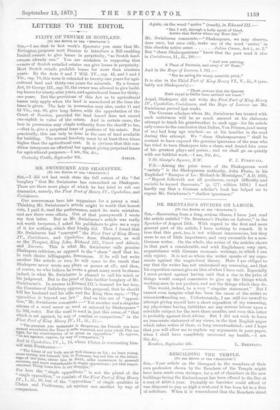MR. SWINBURNE AND SHARSPERE.
ere THE EDITOR OF THE " SPECTATOR.") 8114—I did not last week state the full extent of the " fiat burglary " that Mr. Swinburne has committed on Shakapere. 'There are three more plays of which he has tried to rob our dramatist, namely, the First Part of Henry IV., Cymbeliine, and Coriolanus.
Our newswomau here lets magazines for a penny a read. 'Thinking Mr. Swinburne's article might be worth that honest coin, I paid it, read the performance, nobed its main mistakes, and saw there were others. Out of that pennyworth I wrote my first letter. But as Mr. Swinburne's article was really not worth twopence, I asked his publishers to give me a copy of it for nothing, which they kindly did. Then I found that Mr. Swinburne had "conveyed" the First Part of King Henry IV., Coriolanus, and Cyatbdinc from Shakspere, as well as the Tempest, King John, Richard III., Venus and Adonis, and Lucrece. This is what Mr. Swinburne calls genuine Shakspere criticism, as opposed to the " sham " stuff that he, in such choice billingsgate, denounces. If he will but write .another like article or two, he will come to the result that Shakapere never wrote any plays or poems at all ; and then, of course, we who believe he wrote a great many must be shams indeed, in what Mr. Swinburne is pleased to call his mind, or his judgment. But to the proof of this further burglary of Mr. Swinburne's. In answer to Edward M.'s demand for her love, the Countess of Salisbury opposes this proposal, that he should kill her husband and his wife, and the King then says,—" Thy opposition is beyond our law." And on this use of " opposi- tion," Mr. Swinburne comments :—" Yet another and a singular misuse of a word never so used or misused by Shakespeare" (p. 342, note). But the word is used in just this sense, of "that which is set against, by way of combat or comparison," in the First Part of King Henry IV., II., ilia 15:- " The purpose you undertake is dangerous, the Friends you have name(' uncortaine, the Time it selfe unsorted, and your whole Plot too light, for the countorpoizo of so great an opposition." (L. wane, "to Bet against, oppose, by way of comparison.") And in Cymbeline, IV., i., 14, where Cloten is contrasting him- self with Posthuraus :- " The Lines of my body are as well drawno as his ; no lease young, more strong, not beneath him in Fortunes, beyond him in the &luau- -tap of the time, abouo him in Birth, alike conversant in general' sornioes, and more remarkeable in single oppositions ; yet this impor- seuerant Thing lones him in my despight."
For here the " single oppositions" is not the plural of the ." single opposition," or combat, of the First Part of King Henry iii., 99, but of the " opposition " of single qualities in Cloten and Posthumus, set against oue another by way of -comparison. Again, on the word " arrive " (reach), in Edward III. :— " But I will, through a holly spout of blood, Arrive that Sestos whore my Hero lies."
Mr. Swinburne commenta,—" Shakespeare, we may observe, does once, but once only, make use of the word arrive' in this obsolete active sense ,Tatius Ccesar, Act i., sc. 2."
But " sham Shakespeareans " know that the poet used it also in Coriolanus, II., iii., 189 :—
" And now arriving A Place of Potencie, and sway o' th' State."
And in the Rape of Lucrece, l. 781 :- " Ere he arrivii his weary noontide prick."
It is also in the Third Part of King Henry VI., V., iii., 8 (pro. bably not Shakspere's) :- "Those powers that the Queens Hath rayed in Gallia hallo arriued our coast."
Argal, Shakspere did not write the First Part of King Henry IV., Cymbeline, Coriolanus, and the Rape of Lucrece (as Mr. Swinburne proved last week).
The German scholars whom Mr. Swinburne has treated with such unfairness will be as much amused at his elaborate attempt to teach his grandmother to suck eggs—for his article only comes to the conclusion that Delius, Von Friesen, (and many of us,) had long ago reached—as at his tumbles in the mud during this attempt. We " sham Shakespeareans " shall be content to have exposed the genuine ignorance of the man who has tried to turn Shakspere into a sham, and denied him some of his greatest plays and poems ; and we shall go on quietly with our faithful work.—I am, Sir, &c., 3 St. George's Square, N.W. F. J. FURNIVALL.
P.S.—Among the prior users of the Shaksperean word " rariety " is the Shaksperean authority, John Florio, in his Englished " Essayes of Lo : Michael do Montaigne," A.D. 1603, —" Report followeth not all goodnesse, except difficulty and varietie be ioyned thereunto." (p. 577; edition 1634.) I need hardly say that a German scholar's book has helped me to expose Mr. Swinburne's " shallow ignorance."


































 Previous page
Previous page